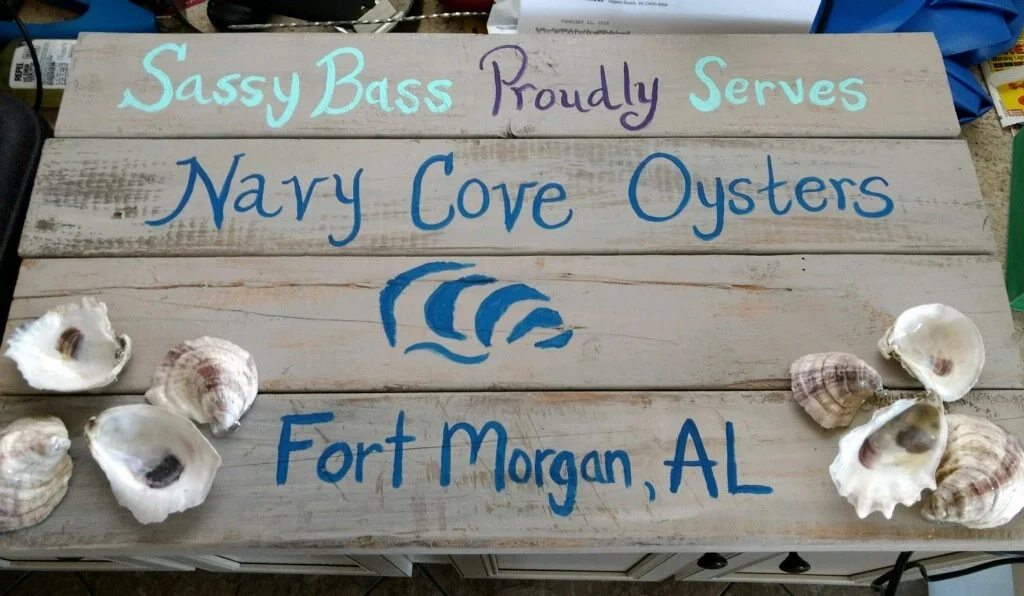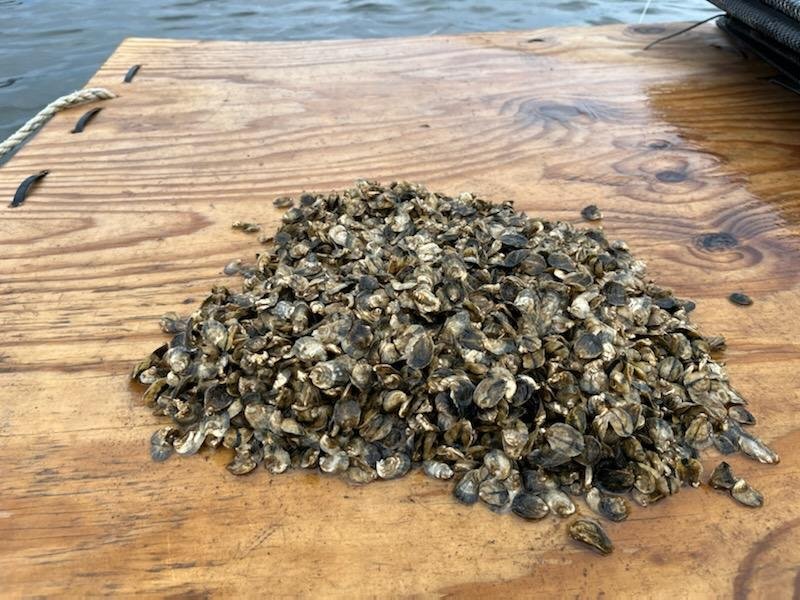Farm Fresh ~ Navy Cove Oysters
FARM FRESH: GETTING TO THE MEAT OF SOUTHERN OYSTER FARMS
Two older guys plus one younger guy equals broader perspectives. Two science guys plus one guy with social media savvy equals key skills covered. No matter how you add up the ownership behind Navy Cove Oysters, the math just works.
Dr. Chuck Wilson, Dr. John Supan and Eric Bradley are partners in Navy Cove Oysters in Fort Morgan, Alabama. Bradley does day-to-day farm chores but also spearheads the brand’s marketing. Wilson and Supan are marine biologists, both retired from LSU, where for 34 years, Supan was the oyster aquaculture specialist. “My job was to teach people how to grow oysters off bottom and to foster oyster hatcheries,” he says. Wilson was a Professor and Director of Louisiana Sea Grant at LSU and Supan’s boss for a time. “We worked together for years, and we developed a great friendship,” Wilson says.
Supan and Wilson’s strong working and social relationship has proven good fuel for the farm. But it’s the farm location that initially sparked the idea. Once Wilson retired, he moved to Alabama’s coast, and when Supan and his wife came for a visit in 2011, the conversation turned to oysters. “We were talking about oyster farms, and Chuck said, ‘What do you think about this spot?’” Supan recalls. They walked right off Wilson’s waterfront property and into the waist-deep water to take a look. It was perfect. “It’s such a good site; that’s why we did this. It’s a hard sandy bottom with good salinity,” Supan says. To work the cages, they simply stroll into the inlet that’s a continually moving mix of waters from Mobile Bay and the Gulf of Mexico. Navy Cove is the only farm in the Gulf that doesn't need a boat.
For the first few years, the farm stayed small, with Supan and Wilson eating most of what they harvested themselves. But when Supan joined Wilson in retirement in 2017, they really got going and growing. Today, Navy Cove has more than 250 cages in the water.
As the farm began to grow, they hired Bradley to do some basic farm tasks, like flipping cages and such. Then, based on a talk they heard at an Oyster South symposium, they re-assessed Bradley’s involvement. “We learned that we’re not selling oysters, we’re selling a story. And we should do that on social media,” Supan says. “But Chuck and I are not on social media. The first time I heard about Instagram, I thought it was a new way to cook grits.”
Bradley came on board as a partner in 2016, where his marketing and social media skills complement Wilson’s and Supan’s oyster experience. “He’s in his 40s, so he’s young, and he’s hip,” Supan says. “He’s doing a great job with our social media.” And Bradely does bring some agricultural background; he’s from a crawfish farming family in Louisiana.
The Navy Cove Oyster team: (left to right) Dr. John Supan, Eric Bradley, Dr. Chuck Wilson and George Allen, Wilson’s neighbor and an honorary member of the Navy Cove crew.
Navy Cove has a nursery, so grows its own seed, and once the seed is planted, raised and pulled from the water, it sells its crop through Bon Secour Fisheries. “They do it all: wash, box, store and deliver,” Wilson says. “They have been in the oyster business for five generations and are very attuned to the market and sales cycles.”
That expertise is a plus, as is Bradley’s storytelling work that’s keeping appetites whetted. But Wilson stresses the key element of success: Their oysters are good. “They’re fat, buttery and salty,” he says. “And sometimes, they’re really salty.”
Others agree. Navy Cove had its best sales this year and has 1 million oysters in the water to be harvested in 2023. Diners can currently find them along the Alabama coast and in Birmingham; in Baton Rouge, Louisiana; Columbus and Atlanta, Georgia; Galveston, Texas; and sometimes in Houston too. “We hope to be back in New Orleans soon,” Wilson says. They even sold out recently. “That’s good, but we don’t want to do that too often.” Wilson says. “We want to stay in people’s minds.”
They’re also expanding minds, giving tours to the general public to explain and promote off-bottom oyster aquaculture and helping Auburn University grad students studying at the nearby AU Shellfish Lab conduct their research. “We usually have a few grad students on the farm, letting them challenge the questions they’re asking at our site,” Wilson says. “And we’re still learning, too. We like to call ourselves a for-profit research farm.”
While Bradley is “young and hip,” Supan notes that he and Wilson are retirees and not looking to do anything that feels like work. So far, oyster farming doesn't. “I enjoy getting to see and hang out with Chuck every week. We’re old friends having fun,” Supan says. “And we’ll keep doing this as long as it is fun. We’re making money too, and that’s pretty fun.”
Wilson’s relishing the positive reaction to Navy Cove’s product. “I like developing and growing something that has a great reputation, and our oysters get a lot of compliments,” he says. “We’re proud of that.”







